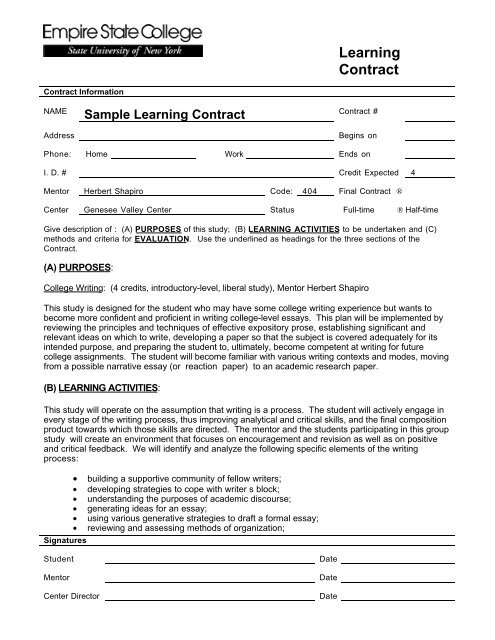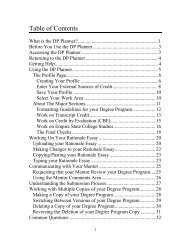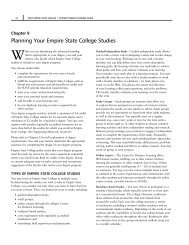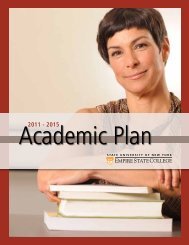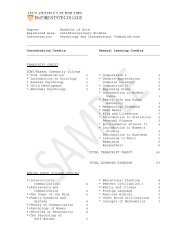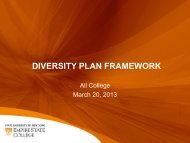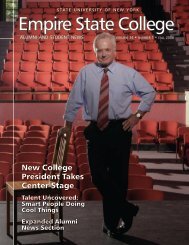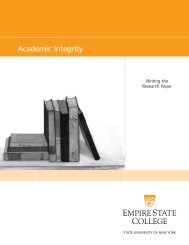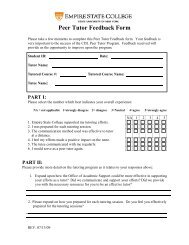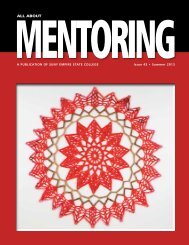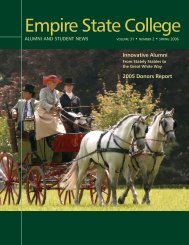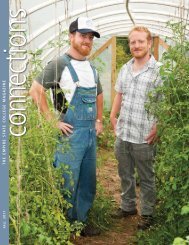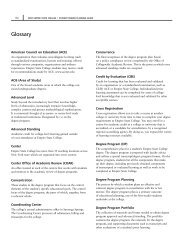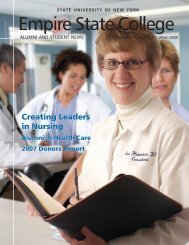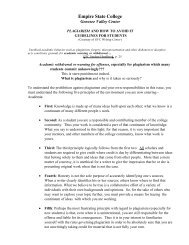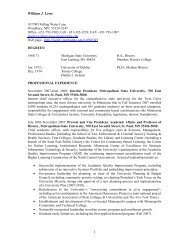Sample Learning Contract
Sample Learning Contract
Sample Learning Contract
Create successful ePaper yourself
Turn your PDF publications into a flip-book with our unique Google optimized e-Paper software.
<strong>Learning</strong><br />
<strong>Contract</strong><br />
<strong>Contract</strong> Information<br />
NAME<br />
<strong>Sample</strong> <strong>Learning</strong> <strong>Contract</strong><br />
<strong>Contract</strong> #<br />
Address<br />
Begins on<br />
Phone: Home Work Ends on<br />
I. D. # Credit Expected 4<br />
Mentor Herbert Shapiro Code: 404 Final <strong>Contract</strong> ®<br />
Center Genesee Valley Center Status Full-time ® Half-time<br />
Give description of : (A) PURPOSES of this study; (B) LEARNING ACTIVITIES to be undertaken and (C)<br />
methods and criteria for EVALUATION. Use the underlined as headings for the three sections of the<br />
<strong>Contract</strong>.<br />
(A) PURPOSES:<br />
College Writing: (4 credits, introductory-level, liberal study), Mentor Herbert Shapiro<br />
This study is designed for the student who may have some college writing experience but wants to<br />
become more confident and proficient in writing college-level essays. This plan will be implemented by<br />
reviewing the principles and techniques of effective expository prose, establishing significant and<br />
relevant ideas on which to write, developing a paper so that the subject is covered adequately for its<br />
intended purpose, and preparing the student to, ultimately, become competent at writing for future<br />
college assignments. The student will become familiar with various writing contexts and modes, moving<br />
from a possible narrative essay (or reaction paper) to an academic research paper.<br />
(B) LEARNING ACTIVITIES:<br />
This study will operate on the assumption that writing is a process. The student will actively engage in<br />
every stage of the writing process, thus improving analytical and critical skills, and the final composition<br />
product towards which those skills are directed. The mentor and the students participating in this group<br />
study will create an environment that focuses on encouragement and revision as well as on positive<br />
and critical feedback. We will identify and analyze the following specific elements of the writing<br />
process:<br />
• building a supportive community of fellow writers;<br />
• developing strategies to cope with writer s block;<br />
• understanding the purposes of academic discourse;<br />
• generating ideas for an essay;<br />
• using various generative strategies to draft a formal essay;<br />
• reviewing and assessing methods of organization;<br />
Signatures<br />
Student<br />
Mentor<br />
Center Director<br />
Date<br />
Date<br />
Date
<strong>Learning</strong> <strong>Contract</strong><br />
Student S.S.# <strong>Contract</strong> #<br />
• reviewing basic elements of grammar and mechanics;<br />
• creating clear transitions between components of the essay;<br />
• constructing an argument based on a clear and defensible thesis;<br />
• developing both critical and proofreading skills in order to establish revision as a fundamental<br />
part of the writing process;<br />
• writing a research paper (choosing a topic, doing library research, outlining and drafting the<br />
essay, revising).<br />
The student will write a series of 800 to 1,000 word essays (3-5 typed, double-spaced pages),<br />
concluding with a longer research paper (8 typed, double-spaced pages).<br />
In order to understand the intricacies of the writing process more thoroughly, the student will also<br />
examine various texts produced by established writers. By providing models of effective expository<br />
prose, and by challenging student thinking, this reading material will help students to improve their own<br />
written work. In studying others writing, we develop a greater awareness of how language functions<br />
in the world--an awareness which can translate to a greater sensitivity to the function of language in<br />
our own writing and speaking. Readings will be selected from The Bedford Guide for College Writers,<br />
5 th Edition (X.J. Kennedy, et.al.) and we will review and discuss these as a group. Supplemental<br />
readings may be provided by Mentor Shapiro to further provide the student with understanding of the<br />
writing assignments required for our group study.<br />
(C) EVALUATION:<br />
Mentor Herbert Shapiro will evaluate the student s work by means of several individualized conferences<br />
(one early in the study and one at the end of the study) and by close review of both drafts and final<br />
copies of all written work. Essays will be evaluated by the basis of the student s improved proficiency<br />
in establishing:<br />
• a clear, effective thesis;<br />
• a coherent organizational structure;<br />
• fully developed and supported ideas;<br />
• use of standard English grammar and mechanics;<br />
• correct use of documentation (using either the APA or the MLA method) where applicable;<br />
• submission of a final portfolio of written assignments.<br />
Participation in the group study (weekly readings and group discussions) will also factor into the<br />
student s final evaluation as we seek to develop a community of learners.<br />
Page 2


